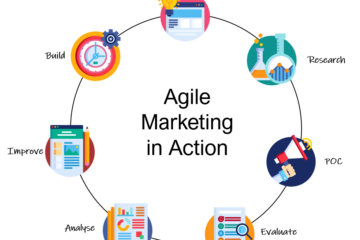Agile methodologies have revolutionized the way businesses approach project management. Agile methodologies are built around collaboration, flexibility, and delivering working software frequently. Agile development methodologies have gained popularity in recent years, with more and more organizations adopting them to improve their project delivery. Here are the top 11 Agile frameworks you need to know:
- Scrum: Scrum is one of the most widely used agile frameworks in software development. It’s a team-based approach to project management that focuses on delivering working software in short iterations called sprints. The Scrum framework emphasizes transparency, collaboration, and continuous improvement.
- Kanban: Kanban is a visual framework for managing work as it moves through a process. It’s a flexible approach to project management that allows teams to visualize their workflow, limit work in progress, and continuously improve their processes.
- Lean: Lean is an agile framework that focuses on reducing waste and maximizing value. The Lean approach emphasizes continuous improvement, eliminating non-value-added activities, and creating a culture of continuous improvement.
- Extreme Programming (XP): Extreme Programming is an agile framework that emphasizes software engineering practices such as continuous integration, testing, and deployment. XP also emphasizes customer involvement in the development process and frequent releases.
- Crystal: Crystal is a family of agile methodologies that are designed to be adaptable to different project types and team sizes. Crystal methodologies prioritize communication, simplicity, and personal interaction.
- Feature-Driven Development (FDD): Feature-Driven Development is an agile framework that emphasizes the delivery of features rather than working software. FDD breaks down development into a series of feature sets and prioritizes feature delivery based on customer value.
- Dynamic Systems Development Method (DSDM): Dynamic Systems Development Method is an agile framework that is designed for projects with tight deadlines and changing requirements. DSDM emphasizes collaboration, frequent delivery, and active user involvement.
- Adaptive Software Development (ASD): Adaptive Software Development is an agile framework that emphasizes continuous learning and adaptation. ASD focuses on the team’s ability to respond to changing requirements and customer needs.
- Lean Startup: Lean Startup is an agile framework that focuses on creating a startup or entrepreneurial environment. Lean Startup emphasizes experimentation, customer feedback, and iterative development.
- Agile Unified Process (AUP): Agile Unified Process is an agile framework that combines the best practices of agile and traditional development methodologies. AUP emphasizes flexibility, continuous improvement, and the importance of architecture in the development process.
- Scaled Agile Framework (SAFe): Scaled Agile Framework is an agile framework that is designed for large organizations with multiple teams working on complex projects. SAFe emphasizes alignment, collaboration, and continuous delivery across multiple teams and projects.
In conclusion, Agile methodologies are rapidly becoming the standard for software development, and organizations are adopting them to improve their project delivery. The top 11 Agile frameworks we have discussed here provide a range of options for teams looking to adopt Agile methodologies. Choosing the right framework for your organization will depend on your project type, team size, and development culture.

0 Comments